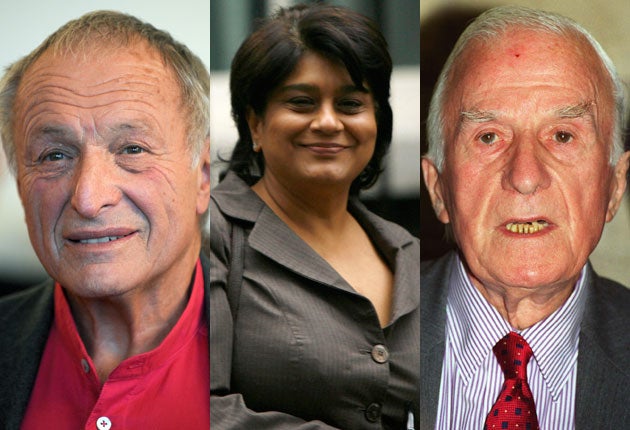Revealed: 137 'silent peers' who make the case for reform

Your support helps us to tell the story
From reproductive rights to climate change to Big Tech, The Independent is on the ground when the story is developing. Whether it's investigating the financials of Elon Musk's pro-Trump PAC or producing our latest documentary, 'The A Word', which shines a light on the American women fighting for reproductive rights, we know how important it is to parse out the facts from the messaging.
At such a critical moment in US history, we need reporters on the ground. Your donation allows us to keep sending journalists to speak to both sides of the story.
The Independent is trusted by Americans across the entire political spectrum. And unlike many other quality news outlets, we choose not to lock Americans out of our reporting and analysis with paywalls. We believe quality journalism should be available to everyone, paid for by those who can afford it.
Your support makes all the difference.Nearly 140 members of the House of Lords have not spoken or asked a question in Parliament for at least a year. The presence of dozens of silent peers, who are all entitled to the privileges of membership, is one of the arguments used to counter those who say the House of Lords works well and does not need reform.
For some peers, the Lords is a convenient club in the centre of London, with free parking, free use of the telephone, a vast library, and subsidised bars and dining rooms.
Others are members of the House of Lords in name only, because they have set foot in the building for years, either because they are too old or have lost interest, but there is no mechanism that allows a peer to resign.
But Nick Clegg, the Deputy Prime Minister, is bracing himself for a long battle when he sets about trying to reform the Lords. A draft bill published last month suggested that the upper house should be reduced to 300 members, 240 of them elected.
More than a third of the 137 "silent" peers – more than one in six of the total membership of 789 – are over the age of 80. Others can be assumed to have stayed away because they have full-time jobs. Some of the political peers appear to believe that their contribution should be confined to voting when called upon by the whips.
Baroness Falkender, 79, who was a powerful figure in Downing Street when Harold Wilson was Prime Minister, still casts her vote in the Lords, but there is no record in Hansard of her ever made a speech since taking her seat in July 1974.
The Tory peer, Tim Bell, Margaret Thatcher's former PR adviser, began his most recent speech in the Lords, in February 2008, by admitting: "I rarely speak in the House." The authoritative website theyworkforyou.com said it was the first time he had spoken in the Lords in six years.
The architect Richard Rogers, who was made a Labour peer by Tony Blair in 1996, is heard to speak only when the Lords are dealing with legislation that affects his profession.
"Many peers take our job of amending laws and controlling governments as seriously as the public expect," the Liberal democrat peer Lord Oakeshott said yesterday.
"But at almost 800, the fattest House of Parliament in the world, we are bursting at the seams. These hundred-plus sleepy peers should wake up or move out. It's time for reform for a democratic, vigorous second chamber instead of our accidents of history."
Though peers cannot resign the rules say those who are too busy or too ill to take part should say so and take "leave of absence". Only 21 out of 137 silent peers have done so since last year's general election. Official absentees include the EU foreign minister, Baroness Ashton, and Baroness Amos, a relief co-ordinator for the United Nations.
Even those on leave of absence can use Parliament's comfortable facilities. Those who do not apply for leave of absence can vote whenever an issue attracts their interest.
The biggest turnout in recent times was when the coalition government's plan to redraw parliamentary constituency boundaries without consulting local opinion scraped through the Lords by 266 to 262 – a rare occasion when more than two thirds of the membership of the Lords voted.
It is also impossible to strip them of their peerages even if they are convicted criminals, unless they have been found guilty of treason. The novelist Jeffrey Archer is still a peer, though he has not played any role in the Lords since he was sentenced to four years in prison for perjury ten years ago.
Join our commenting forum
Join thought-provoking conversations, follow other Independent readers and see their replies
Comments